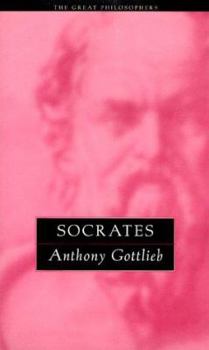Socrates: The Great Philosophers
Philosophy is one of the most intimidating and difficult of disciplines, as any of its students can attest. This book is an important entry in a distinctive new series from Routledge: The Great... This description may be from another edition of this product.
Format:Paperback
Language:English
ISBN:0415923816
ISBN13:9780415923811
Release Date:July 1999
Publisher:Routledge
Length:64 Pages
Weight:0.15 lbs.
Dimensions:0.2" x 4.3" x 7.0"
Customer Reviews
4 ratings
Go beyond "Bill and Ted"
Published by Thriftbooks.com User , 15 years ago
Everyone knows Socrates. After all, he appeared in "Bill and Ted's Excellent Adventures" (though viewers of that film will learn nothing about him except how to mispronounce his name). Other popular shows, such as Saturday Night Live, have also spoofed the redoubtable endlessly questioning gadfly of Greece's Golden Age. Without doubt, Socrates has probably made more appearances in mainstream culture than any other major philosopher. Doubtless his personal eccentricities contribute to this eternal personality cult. But what of the "real" philosopher? The mythical Socrates remains more generally famous for his willful drinking of hemlock in 399 BC than for any ideas or philosophy he expounded. His story is an impressive one. Unfortunately, we only know of this man from the sources of others. As far as the historical record shows, Socrates wrote nothing. He therefore remains a nebulous mystery accessible only via a circle of the few contemporaries who did write about him. This short 58-page book discusses these sources, and attempts to crystallize, as far as possible, Socrates' true philosophy. The book starts with a somewhat romanticized view of the unsightly sage by referring to him as "philosophy's martyr." Though exaggerated and slightly misleading, Socrates did accept his hemlock on principle. After a short account of his bizarre behavior, related by troops who served with him, and a hilarious "beauty contest" dialog, the text dives into Socrates' trial as depicted in Plato's "Apology." Of all surviving accounts, Plato appears as Socrates' most dedicated devotee. In this famous trial, the restored Athenian democracy accused Socrates of defiling youth and disrespect towards the Gods. His response comprised less than legal brilliance: he claimed that he had helped Athens by his endless questioning and discoursing. Consequently, the state should provide him with free meals for the rest of his life. The court ruled for the death penalty. Socrates accepted his sentence and refused opportunities to escape. Was he afraid? Well, according to Plato he reacted to his verdict with the statement: "to be afraid of death is only another form of thinking that one is wise when one is not." In other words, why fear something we know nothing about? So he passed into principled history. The text gets controversial when it accuses Plato for using Socrates as a mouthpiece. After all, we only have Plato's side of the story, not Socrates'. So who knows which ideas were Socrates' and which Plato's? Only speculation exists. Nonetheless, the text refers to the other sources we have of Socrates, namely Xenophon, Aristophanes, and Aristotle. These present such disparate views that collating them into one perspective presents challenges. The text summarizes Xenophon's depiction of Socrates, quoting Jonathan Barnes, as "a stuffy old prig." Aristophanes satirizes Socrates and Aristotle only knew of him through Plato. If one wants to compare Socrates to Jesus Christ, one can
Short But Sweet
Published by Thriftbooks.com User , 21 years ago
Socrates was important as a cultural figure who showed other people how to be a philosopher. Much of this entertaining account talks about Socrates' lifestyle and personality. There are amusing little vignettes, such as how Socrates fended off the homosexual advances of the much younger Alcibiades, who later became a traitor to Athens.The book emphasizes that Socrates did not advance his own positions as much as he criticized those of others. Now that I have read this shorter work on Socrates I feel prepared to move on to longer works on Plato and Aristotle.
Short bio
Published by Thriftbooks.com User , 21 years ago
It's short (54 pages), but that's alright since there's only second-hand accounts of Socrates anyway. Anthony Gottlieb makes the most of this space and you end up with a pretty good idea of how Socrates viewed life and intellectual inquiry, as well as the distinctions between his philosophy and that of Plato and other followers and critics. Since he is the first significant philosopher, he's worth understanding, and this book will not consume much of your time.
Excerpts from the book are available online
Published by Thriftbooks.com User , 25 years ago
Three substantial excerpts from the book, plus more information, are available online at http://www.btinternet.com/~socratic





